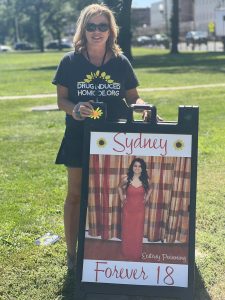Mom takes aim at drug dealers
By Kevin Beese Staff Writer — September 19, 2023
Terry Almanza, a former Chicago police officer, stands behind a poster of her daughter, Sydney Schergen, who died in 2015 from a lethal dose of ecstasy. (Facebook photo)
First in a series looking at drug-induced homicides
Terry Almanza, a 28-year Chicago police officer, admits that she was a hovering mom after her daughter experimented with drugs.
She put software on her daughter’s phone to track her whereabouts and read her texts.
Her daughter, Sydney Schergen, had plenty of benefits, growing up in the Mount Greenwood neighborhood in Chicago and attending Catholic schools. She had a college scholarship to continue her volleyball career.
However, a traumatic event from Sydney’s childhood stayed with her and she looked to numb the pain, Terry Almanza said. Sydney was in counseling, as were she and her Chicago firefighter husband.
In 2013, at the age of 18, Sydney Schergen, looking to numb that pain, took a fatal dose of ecstasy and died of MDMA poisoning, her mother said.
“Kids are supposed to learn from their mistakes, not die from them,” Terry Almanza said.
With her daughter dying of a fatal dose of methylenedioxymethamphetamine, Almanza expected Chicago police to find the offenders who sold her the deadly drugs. Chicago police said they were not going to investigate the case criminally.
“They knew what took place was done criminally, that somebody did sell the drugs to her that killed her,” Almanza said. “I was aggravated. Why was somebody not going to go to jail?”
Almanza went into action and started doing research. She found out about a seldom-used state statute that had been on the books since 1988, allowing for the criminal prosecution of drug-induced deaths.
She told Chicago police about the statute, but they still opted not to pursue charges.
“I was not asking them to smear the lines because I was a police officer. My daughter died in Chicago. I wanted charges brought,” Almanza said. “I met with the chief of the Chicago Police Department’s Organized Crime Unit. I told him, ‘I’m not going away.’”
“I had to do what my heart was telling me to do,” Almanza said.
She continued to lobby the chief of CPD’s Organized Crime Unit to pursue criminal charges.
“He told me even if we do find the people, they are never going to admit to providing a lethal dose of MDMA,” Almanza said. “I said, ‘Just try.’”
Sixteen months later, Chicago police brought two suspects in for questioning, and they admitted supplying the lethal dose of MDMA to Sydney Schergen.
“I wanted culpability. They knew what they sold was lethal to an inexperienced user,” Almanza said.
Brent Tyssen of Midlothian pleaded guilty and was sentenced to six years in prison for selling Schergen the fatal drugs.
Tyssen’s girlfriend, Cynthia Parker of Alsip, also plead guilty and was sentenced to probation. She was charged as a juvenile because she was 17 when Schergen’s death occurred.
While out on bond in the Sydney Schergen homicide case, Tyssen and Parker were arrested in Orland Park for allegedly trying to sell 110 hits of LSD to an undercover officer.
“Persistence is not going to bring my child back, but these people don’t stop,” Almanza said.
Next week: A mother starts a movement



